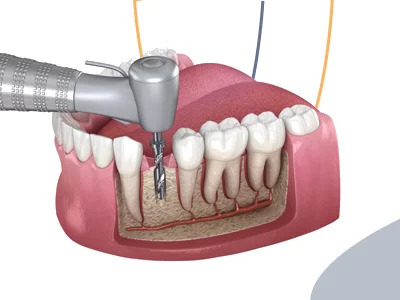RCT
Root Canal Treatment
A root canal treatment, also known as endodontic therapy, is a dental procedure aimed at treating the inner part of a tooth when it becomes infected or damaged. Inside a tooth, beneath the enamel and dentin, there is a soft tissue called the dental pulp. This pulp contains nerves, blood vessels, and connective tissue that can become infected due to severe decay, a crack or chip in the tooth, or trauma.
During a root canal treatment, a dentist or endodontist (a specialist in treating the inside of the tooth) removes the infected or damaged pulp, cleans, disinfects, and shapes the inside of the tooth’s canal, and then fills and seals the space. This process helps to prevent further infection and saves the natural tooth, which might otherwise need to be extracted.


Root Canal Treatment Procedure:
- Diagnosis: The dentist examines the tooth, usually with X-rays, to determine the extent of damage or infection.
- Anesthesia: Local anesthesia is administered to numb the area around the tooth, ensuring the patient feels little to no discomfort during the procedure.
- Pulp Removal: The dentist creates an opening in the tooth and removes the infected or damaged pulp.
- Cleaning and Shaping: The interior of the tooth is thoroughly cleaned, disinfected, and shaped to prepare it for filling.
- Filling: The cleaned space is filled with a biocompatible material (usually a rubber-like substance called gutta-percha) to seal the root canals.
- Sealing: The opening of the tooth is sealed with a temporary or permanent filling to prevent recontamination.
After a root canal, the tooth might require a crown or other restoration to protect and strengthen it since the tooth structure might become brittle after the treatment.
Benefits of root canal treatment
- Pain Relief: Root canals alleviate severe tooth pain caused by infection or damage to the dental pulp. The procedure aims to remove the source of the pain, providing relief and preventing further discomfort.
- Prevents Further Infection: By removing infected or damaged pulp and thoroughly cleaning the tooth, a root canal prevents the spread of infection to surrounding teeth and the jawbone, thereby promoting oral health.
- Improves Oral Health: Preserving the natural tooth with a root canal can contribute to better overall oral health. It avoids gaps in the teeth that could lead to issues with biting, chewing, and oral hygiene.
- Cosmetic Benefits: After a root canal, the treated tooth can be restored with a crown or filling, providing a natural appearance and maintaining the aesthetics of your smile.
- Prevents Further Complications: Addressing the infection early through a root canal can prevent more severe oral health issues and systemic health problems that may arise from an untreated dental infection.
- Restores Bite Function: A successfully treated tooth allows for normal biting and chewing, maintaining regular oral functions without discomfort.
Visit our clinic to do the best the root canal treatment in kolkata with the help of an Endodontist and save time. To uphold optimal oral health, prioritize maintaining excellent oral hygiene practices.

Root Canal Treatment
Experience relief with expert root canal treatments. Our skilled endodontists provide pain-free procedures to save your natural teeth. Book your appointment today for comprehensive care and a healthier smile
Aftercare tips following a root canal treatment
After receiving root canal treatments at smile signature dental clinic, proper aftercare is crucial to maintain the longevity and effectiveness of the restorations. Here are the aftercare guidelines:
Especially in the initial days, try to avoid putting pressure on the treated tooth while eating. Stick to softer foods until the area heals.
Maintain good oral hygiene by brushing and flossing regularly. This helps to keep the treated area clean and free from bacteria, aiding in the healing process.
If your dentist has prescribed any painkillers or antibiotics, take them as directed to manage discomfort and prevent infection.
Rinse your mouth with warm salt water a few times a day to reduce any swelling and to keep the area clean.
Make sure to attend any scheduled follow-up appointments with your dentist. These visits are crucial to assess the healing progress and to discuss any concerns.
Steer clear of hard or sticky foods that might cause discomfort or dislodge the temporary filling.
Frequently Asked Questions
Discover answers to common questions about root canal treatments. Learn about the procedure, pain management, success rates, and more. Get informed and make confident decisions for your dental health today!
Symptoms indicating the need for a root canal include severe toothache, prolonged sensitivity to hot or cold, swelling, and tenderness in the gums. Your dentist will conduct tests and examinations to determine if a root canal is necessary.
Contrary to common belief, the procedure itself is typically performed under local anesthesia, ensuring the area is numbed, and patients feel minimal discomfort. Most patients report feeling relief from pain after the infected pulp is removed.
While extraction is an option, it's generally recommended to preserve the natural tooth whenever possible. Root canals save the tooth, maintaining its functionality and preventing adjacent teeth from shifting.
Generally, a crown is recommended to protect and strengthen the tooth after a root canal. It helps to restore the tooth's appearance and functionality, ensuring long-term durability.
The cost of a root canal treatment in Kolkata, India, can vary based on several factors, including the tooth affected, the severity of the infection, the dentist's experience, and the dental clinic's location. On average, the cost for a root canal in Kolkata can range from INR 3000 to INR 8000 or more per tooth.
